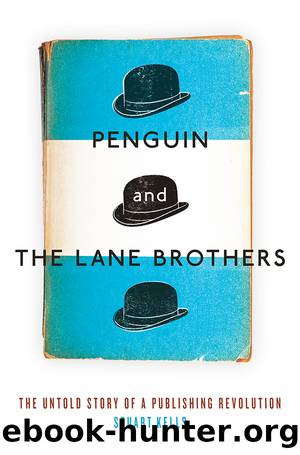Penguin and the Lane Brothers by Stuart Kells

Author:Stuart Kells
Language: eng
Format: epub
Publisher: Schwartz Publishing Pty. Ltd
16
PECKING ORDER
Six of Penguinâs first ten years were years of war. The war tested the still-young imprint in many ways. Like the great majority of British firms, Penguin saw an exodus of personnel into the military machine. In the first year of hostilities, two young Penguiners were killed in France. By 1943, most of Penguinâs pre-war staff and management would be serving in the armed forces. Bob Maynard joined Richard and John Lane in the Royal Navy Volunteer Reserve. Another five Penguiners served with the Navy, seven served in the Army abroad, seven served in the Home Forces, one joined the Auxiliary Territorial Service and one joined the WAAF. The war challenged and transformed Penguinâs philosophy and operating model, and in some surprising ways was a boon for an enterprise still shaky on its feet: the demand among soldiers, sailors and airmen for pocket-sized paperbacks was very high. Though the war brought Richard and John close as never before, it also estranged Allen from his brothers.
To understand the impact of the war on the Lane brothers and on Penguin, we have to backtrack a few years. Before the war, the brothers worked together for the first time in their professional lives. At The Bodley Head and then at Penguin, the characteristic familial bond transmogrified into occupational collaboration. Richardâs memories of Australia were fresh in his mind â memories of isolation, loneliness and poverty. The contrast between that time and this new period of business partnership was stark. In the lead up to the war, the Williams-Lanes enjoyed a satisfying prosperity, and Richard was blissfully happy to be working in London with his brothers and his books. He assumed Allen and John felt more or less the same way about things, and that the augmentation of their relationship would carry on smoothly.
Each of the brothers was a formidable talent in his own right. Bringing them together at work promised much more than a humble lane towards success: they were building a broad thoroughfare, even an expressway. But, to extend the metaphor, each lane on the freeway had its own speed limit and destination. Allen in particular was intent on going his own way. From his actions and contemporary documents, it is possible to glean much of what was going through his mind during this period. Richardâs sanguine hopes for fraternal harmony proved to be misplaced. Most of Allenâs mental traffic was out of sync with his brothersâ plans.
The astrological reports that Allen commissioned in the 1930s are fascinating documents, and a surprisingly useful source of information about Penguin and the Lanes. Like the advice of a more conventional analyst, the reports were based on interviews; they engaged with the subjectâs thoughts, feelings and priorities; they adopted a psychological vocabulary of ego, libido and instinct; and they provided guidance for Allen in both his personal and professional life. That Allen studied these reports and took them seriously is certain. He asked the astrologists and psychics follow-up questions, he sought repeat advice, he
Download
This site does not store any files on its server. We only index and link to content provided by other sites. Please contact the content providers to delete copyright contents if any and email us, we'll remove relevant links or contents immediately.
Autoboyography by Christina Lauren(4683)
Asking the Right Questions: A Guide to Critical Thinking by M. Neil Browne & Stuart M. Keeley(4592)
Dialogue by Robert McKee(3589)
Eat That Frog! by Brian Tracy(3523)
Sticky Fingers by Joe Hagan(3456)
Journeys Out of the Body by Robert Monroe(2995)
Elements of Style 2017 by Richard De A'Morelli(2945)
Annapurna by Maurice Herzog(2846)
Schaum's Quick Guide to Writing Great Short Stories by Margaret Lucke(2807)
Full Circle by Michael Palin(2780)
The Diviners by Libba Bray(2447)
The Art of Dramatic Writing: Its Basis in the Creative Interpretation of Human Motives by Egri Lajos(2416)
The Mental Game of Writing: How to Overcome Obstacles, Stay Creative and Productive, and Free Your Mind for Success by James Scott Bell(2398)
Why I Write by George Orwell(2362)
Atlas Obscura by Joshua Foer(2351)
In Patagonia by Bruce Chatwin(2275)
The Fight by Norman Mailer(2160)
The Elements of Style by William Strunk and E. B. White(2077)
Venice by Jan Morris(2055)
